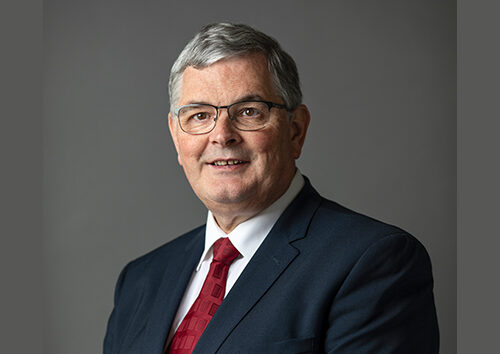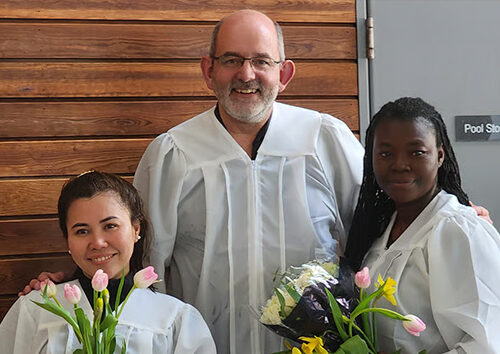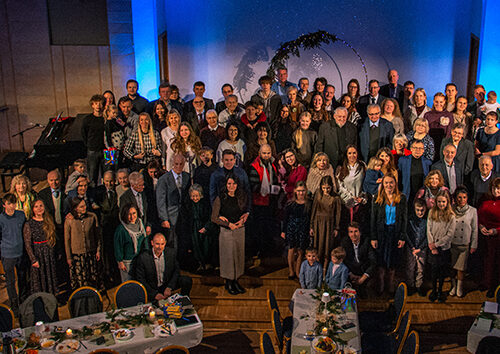03 January 2024| St. Albans, UK [David Neal]
Buckle up your seatbelt for 2024, as geopolitically, this year will be turbulent! No exaggeration, no hyperbole – because with almost four billion people exercising their right to vote and all the accompanying fears and expectations, many global leaders will breathe a huge sigh of relief if the world gets to 31 December 2024 unscathed. While sounding like a triumph for democracy, some voters wearily know the outcome before the ballot takes place. For others, the words ‘free and fair’ are unknown in their vocabulary.
‘The Final Battle’?
Most prominent will be the November US presidential election – historically the high-water mark of democracy. But this election to choose the 47th president is set to be the most constitutionally challenging ever known. With both leading candidates portraying the other as not just ‘bad alternatives for America’ but as ‘cataclysmic ones’, Frank Bruni, in his 3 January New York Times op-ed, comments, “This isn’t your usual negative partisanship, in which you try to win by stoking hatred of your opponent. It’s apocalyptic partisanship, in which your opponent is the agent of something like the end of days.” Is this an attention-seeking comment from a lazy journalist? If only! To the contrary, his view is drawn from what he has witnessed – one candidate describing the campaign in biblical terms as the ‘final battle’, and the other accusing his opponent as ‘determined to destroy American democracy’. (1) The mood of both candidates suggests US democracy is in deep trouble.
It leads me to wonder again about what John saw in Revelation 13 and how Adventists understand what he saw. I have to confess that in my early years of ministry, the very idea that the US could be anything less than ‘the land of the free’ seemed far-fetched. (2) In these times, I am inclined to listen to Paul’s wisdom: ‘not to despise prophecies – but test everything’. (1 Thessalonians 5:19 & 20 ESV)
But it’s not only US democracy which is under strain. While it is easy to highlight US problems, democracy in Western Europe faces similar pressure points. Liberal-democratic powers with an internationalist worldview encouraged by the European Union, are seeing serious and significant push-back. The reasons for this are complex, but one, in particular, is associated with a form of Christian nationalism (a belief that our country is based on the principles of Christian values, and we are determined to ensure that these remain, and if necessary enforce for all our citizens whoever they are, and from wherever from). (3)

‘Multipolar disorder’
In its preview of 2024, The Economist describes the geopolitical condition as experiencing ‘Multipolar disorder’ with “The new dynamic as one of instability”. (4) As the line of the old hymn, “What a Friend We Have in Jesus”, asks, “Is there trouble anywhere?” “Yes, there certainly is – and not just anywhere – but everywhere” must be the contemporary reply. With the fear of ongoing wars in Europe and the Middle East expanding regionally, and with the temperature of ‘cold wars’ steadily rising in both the China Sea and the Western Balkans, Kendra Valentine accurately describes the mood of our times – “There’s a lot of fear in the air these days”. (5)
How quickly the joyful December Advent season changes once January arrives with its challenges and fears for the year ahead. And how easy it is to forget the line we sang during the Advent season from the hymn “O Little Town of Bethlehem” – “The hopes and fears of all the years, are met in thee tonight.” For isn’t the story of Advent the remedy to replace fear with hope? And what about the experience of the son of God moving into our neighbourhood – the mystery of God with us? “And the Word became flesh and dwelt among us, and we have seen his glory, glory as of the only Son from the Father, full of grace and truth.” (John 1:14)
Not Warriors but Witnesses
John also vividly reminded the 1st-century Christian community to engage with evil whenever and wherever evil appears – not as warriors but as witnesses (Revelation 1-3). ‘His glory’ shines much brighter than the increasing ‘Motipolar disorder’, when Christians show and tell grace and truth as an ‘alternative story’, which “Unmasks the dominant ideology of power as deceitful, rapacious, and exploitative”. (6) Rather, through witness in both word and deed, the Christian is to tell the glorious story of “the finished work of Christ on the Cross, his ascension to reign, and his soon return.” It stands in direct contrast to the ‘warrior’ mindset which seeks to resolve the problem of evil by force. (7)
The contrast between warriors and witnesses is a reminder at the personal level of the trap James and John fell into. After being refused lodging in Samaria because of the well-known hatred between Jews and Samaritans, the lads were fuming, and their tempers raged. “Lord, do you want us to tell fire to come down from heaven and consume them?”(Luke 9:54 ESV) Quickly remembering Elijah’s instant judgement (2 Kings 1:9), they were slow to remember Jesus’ love for the Samaritan community. Luke records his response, “But he turned and rebuked them” (Luke 9:55 ESV). The love of Christ for ‘the other’ was a signal that ‘warrior’ or ‘culture war’ behaviour has no place in His Kingdom.
A Lesson for the Church?
As politicians of all shades from left to right make their case to serve this year, an application from Luke 9:49-56 also provides a lesson for the church.
“The conviction that our beliefs and our methods alone are correct has been the cause of more tragedy and distress in the Church than almost any other thing. Oliver Cromwell wrote to the intransigent Scots, “I beseech you by the bowels of Christ, think it possible that you may be mistaken.” Our tolerance must not be based on indifference but on love. We ought to be tolerant not because we could not care less but because we look at the other person with the eyes of love. (8)
In the midst of the current ‘Multipolar disorder’, God help us personally and the church collectively, to be growing and faithful witnesses to who He is.
- https://www.nytimes.com/2024/01/02/opinion/trump-biden-election.html
- For a new and excellent contribution to understanding the religious and political forces at work in the US today, highly recommended is a new book by Tim Alberta – “The Kingdom, The Power, and the Glory” (American Evangelicals in an Age of Extremism).
- For a detailed explanation of Christian nationalism go to: https://en.wikipedia.org/wiki/Christian_nationalism
- The Economist – “The World Ahead 2024, November 18-24 edition, p. 8
- https://podcasters.spotify.com/pod/show/ted-communication/episodes/Take-heart–I-am–Do-not-be-afraid–tedNEWS-e21d783
- Biblical Critical Theory: How the Bible’s Unfolding Story Makes Sense of Modern Life and Culture, p. 537. (Please note, to ensure there is no misunderstanding, this excellent and comprehensive reference work is not a product engaging in higher criticism of scripture, but “to make visible the deep structures of a culture to expose and change them.” (from the Forward by Tim Keller). The quotation uses a little-used English word, ‘rapacious’, meaning to exploit for greed.
- ibid, p. 538
- The New Daily Study Bible, The Gospel of Luke, William Barclay p.154 & 155
[Photos: Shutterstock]



